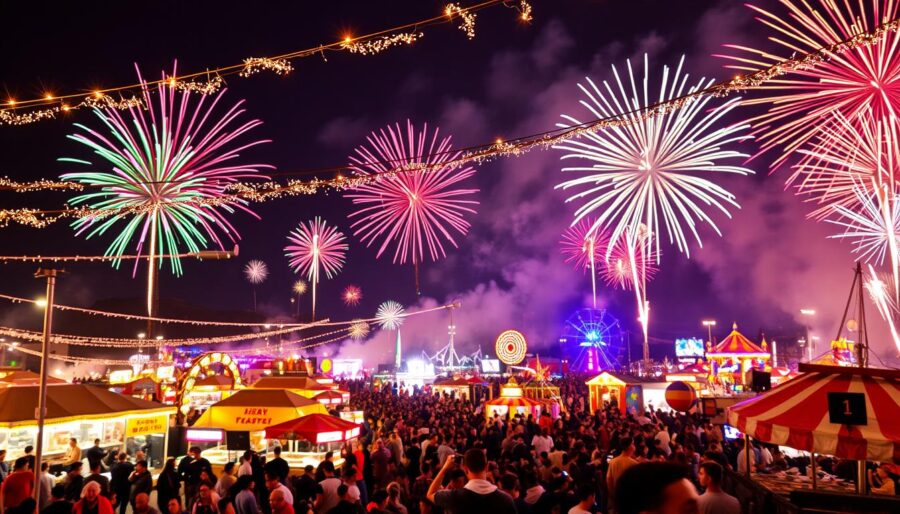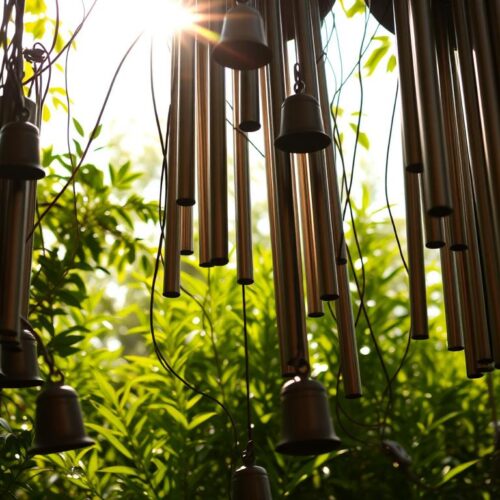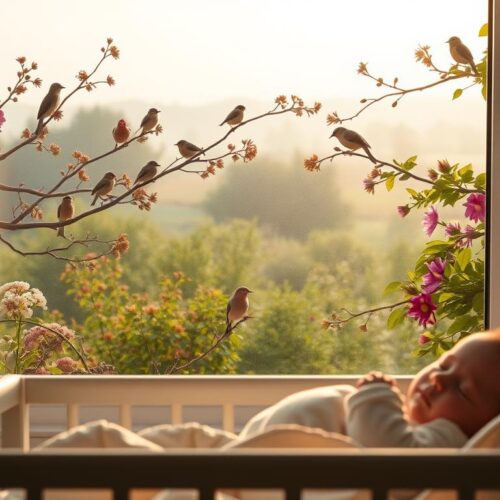As the seasons change, you’ll find more seasonal noise from fireworks, festivals, and outdoor events. These sounds can upset our daily peace. Yet, knowing the right steps can help you keep your area calm.
When you know the issues with seasonal noise, taking early action helps. This guide gives you tips and ideas to manage these loud sounds. It talks about ensuring safety, making plans, and working with your community.
Understanding Seasonal Noise: What You Need to Know
Seasonal noise comes with holidays that celebrate with fireworks and outdoor events. During big celebrations like the Fourth of July and New Year’s Eve, places all over, including in the US and the UK, see a lot of noise. Knowing where and when this noise happens can help you get ready for it.
Fireworks, parades, outdoor concerts, and street parties are common sources of seasonal noise. These fun events cause a lot of noise pollution, affecting the quiet in neighborhoods. Fireworks can scare pets and bother people who aren’t celebrating.
Knowing when and how long the noise will last can help you plan against it. Fireworks on the Fourth of July, for instance, are mostly in the evening. By learning these patterns, you can take steps early to keep your home quiet and keep the peace in your community.
The following table outlines common sources and characteristics of seasonal noise:
| Source | Characteristics | Impact |
|---|---|---|
| Fireworks | Loud, sporadic | Startles pets, disrupts sleep |
| Parades | Continuous, rhythmic | Traffic delays, community gathering |
| Outdoor Concerts | High volume, prolonged | Limited to specific areas, entertainment |
| Street Parties | Variable, dynamic | Community engagement, loud conversations |
By learning about seasonal noise, you can plan better for holiday celebrations and fireworks. Staying informed helps you deal with the festive season more easily and be better prepared.
The Effects of Fireworks on Your Well-Being
The sudden fireworks noise can stress out people and animals. This loud noise can hurt your well-being. It can make you feel stressed and anxious.
Especially for animals like dogs, noise impact is tough on them. They might start to act out by pacing or panting a lot. They could even try to run away. It’s important to see these signs of anxiety in pets caused by fireworks.
For people, the mental strain from fireworks is also a big deal. They can mess with how well you sleep. You might feel worried for a long time during and after a fireworks show. This trouble can stick around, impacting your life after the event.
| Impact | Humans | Animals |
|---|---|---|
| Anxiety | Yes | Yes |
| Disrupted Sleep | Yes | No |
| Stress Behaviors | Yes | Yes |
Festivals and Live Events: Anticipating Noise Levels
Outdoor festivals and live events, like concerts and community gatherings, are loud. Knowing about these noise levels is important for planning good events. It makes sure everyone has a good time, even people living nearby.
When planning an event, picking the right place is key. If the venue is far from homes, it bothers fewer people. Event organizers can also keep noise down. They do this by placing speakers carefully and controlling the volume.
If you’re going to a festival or live nearby, being ready helps. Wearing noise-canceling earplugs or headphones protects your ears. And knowing the event’s schedule helps you plan ahead and avoid loud noise.
Managing noise levels at events means a better time for all. It makes sure the fun doesn’t ruin the peace and quiet for others.
Strategies for Dealing with Seasonal Noise
When fireworks and festivals get loud, finding ways to deal with the noise is key. We’ll look at simple ways to keep your place quieter during these noisy times.
One good way to fight noise is with soundproofing techniques. Think about putting up heavy curtains or installing soundproof panels. This can block a lot of the noise from outside celebrations. Your home will feel more peaceful.
Using white noise machines is also smart. These gadgets create a steady sound that hides the loud blasts of fireworks or music. They’re great for those who wake up easily or get bothered by sudden loud noises.
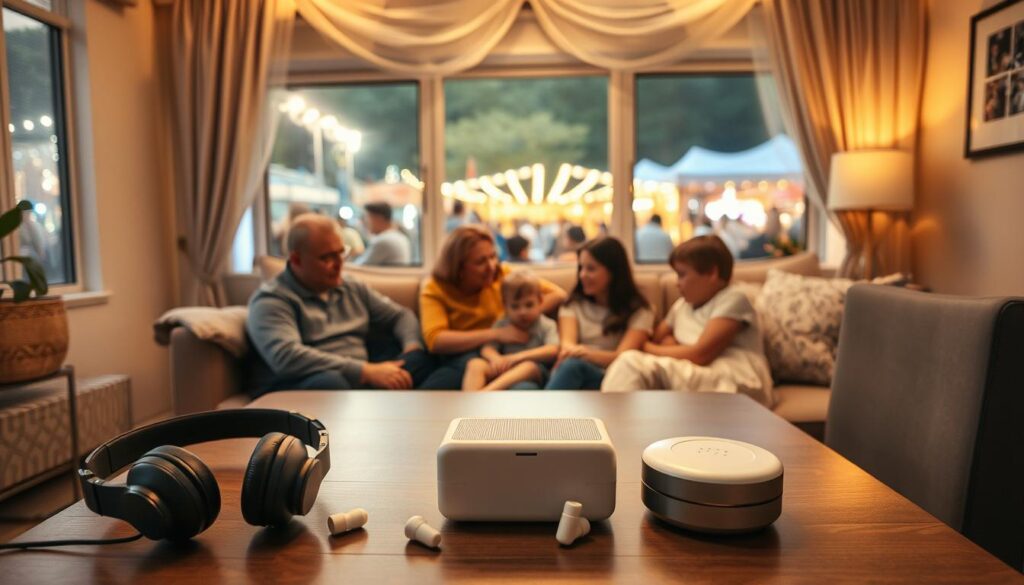
For quick fixes, try earplugs and noise-canceling headphones. These are perfect when you need a break from the noise. They can help you concentrate or sleep better.
Using these soundproofing strategies and quick solutions helps handle noise well. This means you can stay calm and happy, even when there are big celebrations outside.
Communicating with Neighbors About Noise
Talking to your neighbors about noise is key, especially during noisy seasons. It’s best to talk respectfully and maintain peace. Starting with neighborhood noise rules can help a lot. Here’s how you can live peacefully with your neighbors:
- Set Up a Meeting: Arrange a casual meeting to discuss noise concerns and find common ground.
- Share Event Schedules: Inform neighbors about upcoming events or parties to give them a heads-up.
- Respectful Tone: Always approach conversations with a considerate and respectful tone to avoid conflicts.
Understanding your neighborhood’s noise rules can prevent problems. Sharing these rules with your neighbors helps everyone get along. Here is a table showing common noise issues and how to solve them:
| Noise Source | Common Complaints | Suggested Resolutions |
|---|---|---|
| Fireworks | Late-night disturbances | Limit use to specific times |
| Parties | Loud music | Lower volume by 10 PM |
| Outdoor Events | Prolonged noise | Notify neighbors in advance |
Addressing noise issues together promotes harmony. Open and respectful talks are essential for a friendly neighborhood.
Tips for Parents: Managing Noise Around Children
Keeping your child’s sleep peaceful during noisy times is tough. It’s important, especially when there are celebrations. Begin by checking how loud your home is. Then, use white noise machines or make some rooms soundproof for quiet areas.
For noisy community events and festivals, prepare in advance. Use blackout curtains and earmuffs for babies. Try to adjust their sleep times to fit around these events.
Making your home more peaceful benefits everyone. Get the whole family on board with quiet activities and polite behavior. With these steps, your kids can stay calm and happy when it’s noisy.
| Tips | Description |
|---|---|
| White Noise Machines | Utilize these devices to mask disruptive sounds, promoting uninterrupted sleep. |
| Soundproofing | Invest in soundproof curtains or window inserts to minimize external noise. |
| Blackout Curtains | These can help in reducing visual and auditory disturbances. |
| Scheduling | Plan your child’s sleep around noisy events to avoid disruptions. |
| Earmuffs | Use them during particularly loud events such as fireworks or concerts. |
By following these tips, you make sure your child sleeps well, even when it’s loud. Taking control of noise helps improve their sleep and overall health.
Alternatives to Traditional Celebrations
Communities are changing. They need better ways to manage noise during celebrations. Innovative fireworks alternatives are crucial for this reason. These new options let us enjoy the excitement without loud noises from traditional fireworks.
Laser light shows and drone displays are great for quiet events. They offer amazing visuals without the loud noise. Plus, they’re safer and better for the environment.
Laser light shows can amaze people of all ages. Cities like Austin and Las Vegas use them for big events. This shows they’re a great substitute for regular fireworks.
Drone light shows use many drones with lights. They can form elaborate patterns in the sky. Shows at events like New Year’s Eve in Shanghai and the Super Bowl have shown how drones can impress us quietly.
| Event Type | Traditional Fireworks | Fireworks Alternatives |
|---|---|---|
| Noise Level | High | Low |
| Environmental Impact | High | Low |
| Safety Risks | High | Low |
| Cost | Medium to High | Variable |
| Visual Appeal | High | High |
These new alternatives meet the need for quieter and safer celebrations. Whether using lasers or drones, your event can be memorable without noise. This makes the celebration fun for everyone.
The Role of Local Authorities in Noise Regulation
Local authorities are crucial in noise regulation, keeping the peace during seasonal activities. They ensure a quiet environment for everyone. This creates a community where all can enjoy quiet and calm.
Local government roles include making and applying laws to control noise. These often set the allowed noise levels and times when quiet is expected. For example, quiet hours are enforced at night and in the early morning. This helps people sleep undisturbed by late parties.
Local governments also help plan events with organizers to reduce noise. They might place barriers around stages or change traffic routes to protect neighborhoods. By talking clearly with event planners, they make sure rules are followed. This helps events run smoothly.
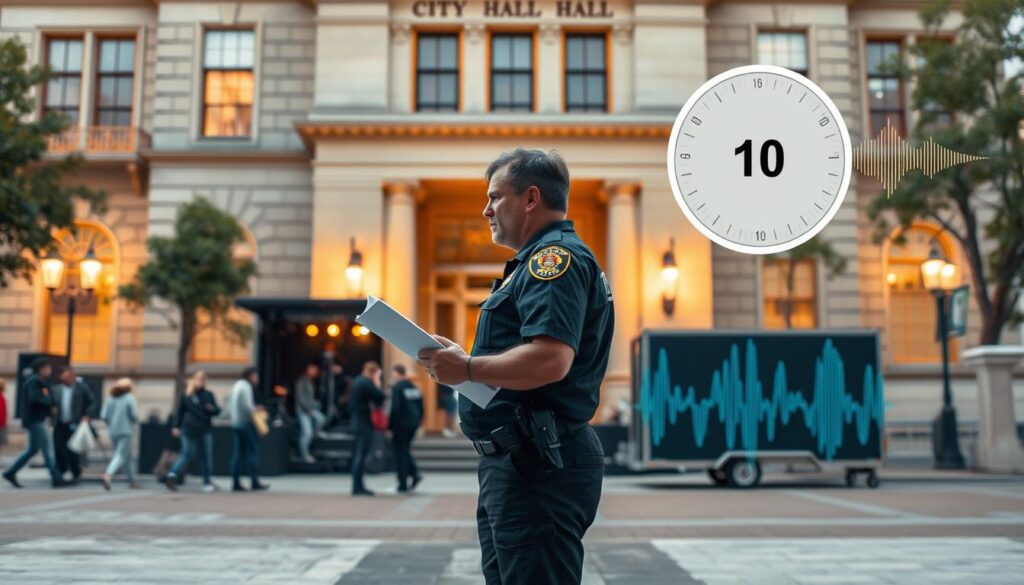
Local officials also track noise with technology. This lets them quickly deal with loud sounds and fine rule breakers. This is especially important in crowded places where noise affects many people.
| Local Government Roles | Actions Taken |
|---|---|
| Establishing Bylaws | Set permissible noise levels, quiet hours |
| Enforcing Regulations | Fines, penalties for violations |
| Monitoring Noise Levels | Real-time tracking, community response |
| Cooperating with Event Organizers | Implementing noise control measures |
In the end, local authorities are key for noise regulation. Through smart actions and rules, they keep our neighborhood peaceful. All these efforts ensure we can all enjoy events without too much noise.
Entertaining in Noise-Prone Areas
When setting up events in busy areas, planning is key. Choose to host during the day. This lessens neighbor complaints. Using methods like sound barriers, placing speakers wisely, and keeping the volume down helps a lot.
Pick places with things like trees or walls that block noise. This helps control sound at your event. Always tell the local authorities about your event plans. This makes sure you follow noise rules.
Talking to the community ahead of time is important. Telling them about the event early reduces complaints and builds positive relationships. Try having quiet zones or plan activities that make less noise at times when noise could bother people more.
Doing these things makes sure your event goes smoothly without upsetting the neighbors. Managing noise well is crucial for keeping everyone happy and the community peaceful.
Seasonal Noise and Mental Health
Seasonal noise from fireworks, festivals, and outdoor events can really impact our mental health. It’s very important to understand how noise pollution affects us, especially when it’s at its peak. Loud, sudden noises and ongoing background sounds can make stress and anxiety worse, disturbing our peace.
It’s key to have good ways to manage stress. Practicing mindfulness meditation, doing breathing exercises, and having calming hobbies can help keep us calm. Also, making a quiet space at home to get away from the noise is great for finding peace.
If noise really starts hurting your mental health, getting help from a professional is a smart move. Therapists and counselors can offer specialized tips for handling stress and anxiety caused by loud noises. Knowing when the noise is too much and taking steps to protect your mental well-being is crucial.
| Strategies | Benefits |
|---|---|
| Mindfulness Meditation | Reduces stress and promotes tranquility maintenance |
| Breathing Exercises | Helps manage immediate stress responses |
| Quiet Space | Provides a retreat to escape noise, enhancing mental health |
| Professional Support | Offers tailored strategies for stress management |
Preparing Your Pets for Seasonal Noise
Seasonal events like fireworks can scare pets. The sudden loud sounds cause anxiety. Making these times hard for our animal friends. To help, there are steps you can take. These steps reduce noise fear and make them feel secure.
Make a quiet spot for your pets away from windows. They can go there when it’s noisy. Anxiety wraps or vests, like the Thundershirt, comfort them. They work by putting gentle pressure on the pet.
Pheromone diffusers, such as the Adaptil plug-in, spread calming scents. These scents reduce anxiety. Plug them in where your pet hangs out before the noise begins.
If these tips don’t work, talk to your vet about medicine for noise anxiety. They know what’s best for your pet, including sedatives or anti-anxiety drugs. Doing this before fireworks can ease your pet’s stress.
- Create a calm and quiet space for your pet.
- Use anxiety wraps or pressure vests for comfort.
- Introduce pheromone diffusers to soothe your pet.
- Consult your veterinarian for medication options, if necessary.
Community Resources for Noise Management
Community resources are key to dealing with seasonal noise. They offer more than one person can do alone. Local places have tools like noise counseling and workshops to help. These help make the neighborhood quieter and calmer for everyone.
Noise counseling gives personal tips to manage noise. You can learn to soundproof your home and deal with noise legally. These services are often free or cheap, so everyone can use them.
Educational workshops teach about noise and how it affects us. They share tips on managing noise and talking to neighbors. Joining these workshops helps you help your community be quieter.

